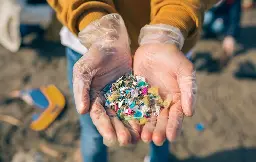Microplastics Found In Human Hearts For First Time, Showing Impact Of Pollution
Microplastics Found In Human Hearts For First Time, Showing Impact Of Pollution

www.forbes.com
Microplastics Found In Human Hearts For First Time, Showing Impact Of Pollution

Microplastics Found In Human Hearts For First Time, Showing Impact Of Pollution::A study published in the journal Environmental Science and Technology for found microplastics in the hearts and blood of humans undergoing cardiac surgery.
